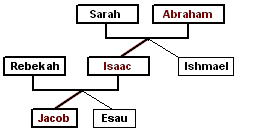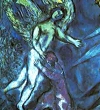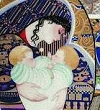|
In parashah Toldot we read that God told Rebekah, "Two nations are in your womb, and two peoples from within you shall be divided..." (Gen. 25:23). These twins, of course, were Esau (עֵשָׂו) and Ya'akov (יַעֲקב), respectively.
 |
According to the great commentator Rashi (among others), Esau was also the founder of Edom (Gen. 25:30), a nation that eventually became identified with political Rome. The issue of the birthright - and therefore the mantle of Abrahamic leadership - was therefore crucial for the history of the Jewish people. To this day, Rome (i.e., "Edom") and Israel are considered perpetual enemies...
Some of the sages have argued that Rebekah's deception of Isaac was la-shamayim, "for the sake of heaven." After all, was she not explicitly told - by God - that "the elder would serve the younger" (Gen. 25:23)? And was it not evident later that Jacob, described as ish tam yoshev ohalom - "a man of integrity who dwelled in tents" - was better suited for Abraham's heritage than Esau, who was described as ish yodea tzayid - "a man who knew entrapment" (the word tzayid suggests that Esau knew how to "entrap," i.e., deceive)? Indeed, Rebekah surely knew that Esau had sold his birthright to Jacob for "a mess of pottage," and she also understood that Jacob had tested his brother to determine whether his commitment to the family and its spiritual purpose was genuine. When Esau later married two "Hittite" women, was this not a source of bitterness to the family (Gen. 26:34-35)? And it's important to remember that Esau's polygamous union with the women of the surrounding pagan culture occurred before the duplicity that led to Jacob obtaining the blessing of the firstborn (bechor) from Isaac....
How could Isaac have been so blind? Couldn't he see the spiritual qualities of his sons? Why didn't he take heed of Rebekah's concern and counsel? And what of the portentous prophecy that the "elder shall serve the younger"? How could Isaac have missed this crucial truth about the future heir of the Jewish people -- especially since it was the overriding concern of his father Abraham? And what about the Akedah itself? Surely Isaac understood the promise that Abraham's legacy would bless the entire world....
But perhaps Isaac may be "excused" from his ignorance because all he ever knew was the integrity and love of his father Abraham, and therefore it would have been unthinkable to him that one of his sons could be a deceiver... The twist here is that the deceiver was not Jacob, but rather Esau, who (according to midrash) "entrapped" his father into thinking that he was so punctilious in keeping the commandments that he would ask him how much salt he should "tithe" before salting his food...
Rebekah's deception of her husband was intended to show him that he was gullible and thereby easily deceived by Esau's hypocrisy. It was an object lesson, if you will, rather than a outright case of "stealing." After all, Esau was soon to arrive - venison in hand - and the charade would be exposed for all to see... No, Rebekah's plan was to "open the eyes" of her myopic husband, revealing to him that he had been guilty of sacrificing the righteous son Jacob for the sake of deceptive Esau.
We all know the story. The dissimulation succeeded, of course, and Jacob managed to "steal" the blessing from his father. When Esau returned from his hunting expedition, Isaac later tremblingly acknowledged to him that "... he (Jacob, not Esau) shall be blessed" (Gen. 27:33), thereby indicating that his spiritual sight was indeed restored. Isaac finally understood the truth about his sons... As Rebekah already foresaw, Jacob was not to be cursed as a deceiver, since it was Esau who all along had been deceiving him!
But Esau cried out with "an exceedingly great and bitter cry" and implored his father, "Bless me, even me also, O my father!" (Gen. 27:34). Isaac again acknowledged that Jacob had come deceitfully and "taken away the blessing," yet Esau persisted: "Have you not reserved a blessing for me?" "Have you but one blessing, my father? Bless me, even me also, O my father" (Gen. 27:34-38).
Isaac then blessed Esau with the same two blessings he gave to Jacob, though the order was reversed: The "fat places" of the earth would be his dwelling and also the "dew of heaven" from above. In other words, Esau would be given prosperity in this world, and then (if he was interested), the "dew from heaven." Jacob, on the other hand, was given the same blessings but in right relation: his first concern would be prosperity in the world to come, and then (if he was interested) would he partake of the "fat places" of the earth.
But what about this "deception for the sake of heaven"? Does the Torah endorse it as some sort of pragmatic necessity to effect the will of God?
Well, despite Rebekah's good intentions, it's clear that the Torah depicts Jacob as complicit in an act of real deception ("Are you my son Esau?" "I am...") -- for which he paid dearly. First he earned the (perpetual) enmity of his twin brother Esau, who sought to murder him for his treachery. When Jacob then fled to his mother's ancestral home, his uncle Laban deceived him several times, first by switching Leah for his betrothed Rachel, and later by fudging with his wages. Later, his firstborn son (of Leah) Reuben dishonored him by committing incest with his concubine Bilhah (Gen. 35:22), and later still, when Jacob attempted to shower "extra blessings" upon his "firstborn son" (of Rachel), his other sons collectively deceived him by implying that Joseph was dead, showing Jacob his the blood-soaked coat of many colors. Fascinatingly, Joseph's subsequent exile in Egypt corresponded to the number of years that Jacob spent away from his own father, Isaac, and he was further deceived into thinking that his long-lost son was an Egyptian vizier...
The enmity of Esau haunted Jacob for years, even to the point of wrestling with the Angel of LORD over the issue (Gen. 32:24-29). From such wrestling came a resolution -- the true blessing from God Himself that resulted in a "limp" -- and the new name of "Israel."

Nonetheless, the sibling rivalry with Esau had cost him dearly. Above all, Jacob yearned for the approval and love of his father Isaac, yet he found himself a fugitive from the land of promise, a vagabond, and bereft of his loving mother's embrace (Rebekah died while Jacob was in exile). Psychologically it may be asked if Jacob's act of deception was not, in effect, a pathetic attempt to "entrap" his father's love. After all, Isaac loved Esau (Gen. 25:28), and Esau was a skilled deceiver. Perhaps if Jacob could be more like his brother, then his father would likewise love him?
What a profound hunger -- for the love of our fathers! I have suffered, as I am sure many of you have, too, with the hunger to feel my father's love, acceptance, and affection, only to be denied, to feel bereft, to be driven and made desperately lonely because of this lack. Each of us must "wrestle with the Angel" to find the source of blessing from our true, Heavenly Father... Each of us must find healing for the abandonment of our fathers by returning to the embrace of our true Father in Heaven.

For an audio discussion on this subject see:
|





